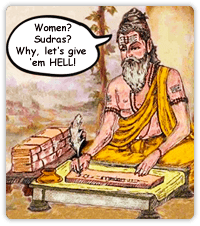When I was growing up I knew Manu as a book of weird sayings and rules supposedly written by the first man in existence. It was something I was aware of and we read it sometimes but I never got the impression it was something to put much stock in. I didn’t realize until I began blogging how much Manusmriti is used to try to discredit Hinduism.
Those who want to paint Hinduism as backward or strange create memes with quotes exclusively from Manu. Which is frustrating because many, I would even say most, Hindus aren’t guided by Manu. He sets out a lot of cultural guidelines and I know there are Hindus who believe we should follow them. And some people follow it “just in case.” Sure, maybe there’s a good reason why you should never share when you see a rainbow or why a woman must always part her hair in the center.
But as we’ve established, I don’t do things because I’m told to. I trust the divinity within myself highly. I believe in understanding what I’m doing and why. I think it’s dangerous not to question and not to find out the reason behind traditions. I see no reason to trust or believe in Manu. As I look into it more for this article I see that he is respected by many and seen as a sage by some. I am surprised to see him referred to in the same sentence with the sage Yajnavalkya, for whom I do have a lot of respect.
You can still believe Manu was the first man without thinking he was all that bright. Is this sacrilegious? No. He’s not an enlightened being and his writings are not scripture. They are more like the Kama Sutra, a guide to life and society. A poor one at that, if you ask me.
When it comes to Manusmriti I would pick and choose what makes sense to follow. There may be some good ideas in there but there’s a lot of crazy too, in my opinion. It’s like with posting quotes on my Facebook page: I post quotes that I agree with regardless of who said them. So if I find something nice in Manusmriti then okay I’ll use that quote, but I still don’t trust most of what he says.
A big problem with Manu is his attitude about women. He definitely talks about us like we aren’t human and we’re just here to distract and harm men. There’s also a lot of stuff about caste rules. Another big problem is that many of the verses are contradictory within the text (this author even says that it contradicts the Vedas). This work more than any other can be used by Hindus to justify whatever one wants and used by non-Hindus to claim all kinds of wild things about what Hindus believe.

I’m not the only one who puts no faith in the Law of Manu. Here is a quote from native Hindu Neelotpal Mukhopadhyay:
Now, there are indeed some slokas in versions of Manusmriti that contain
verses that speak ill of shudras or women. How can a rigid follower of Manusmriti reconcile the two types of verses that are polar opposites? Was such a book laden with major contradictions respected all along history? In that case which parts were followed or rejected?It is claimed that a large number of the anti-shudra/anti-women shlokas, are fake that were inserted later (at what times?, by whom? for what purpose? no one knows)
To me, Manusmriti is merely a compilation of one man’s view about society and his recommendations. That’s all. I haven’t seen any proof that it was used as formal “law/constitution” in Indian kingdoms, and so to assume that whole of Indian society was run based on this one book (like Abrahamic religions!) seems to be utter hogwash.
The claim that the “bad” parts were added by non-Hindus is a little far fetched. I mean, I’m all for blaming colonialism on a lot of the problems in Indian society today, but it feels too convenient to say “All the good parts were us and all the bad parts are from the British.” It’s the “no true Scotsman” logical fallacy, trying to distance one’s self and one’s beloved religion from people who don’t show it in its best light.
So if you’re looking for Hindu philosophy to read, don’t bother with Manu. Go for the Vedas, the Upanishads, and the Gita.














